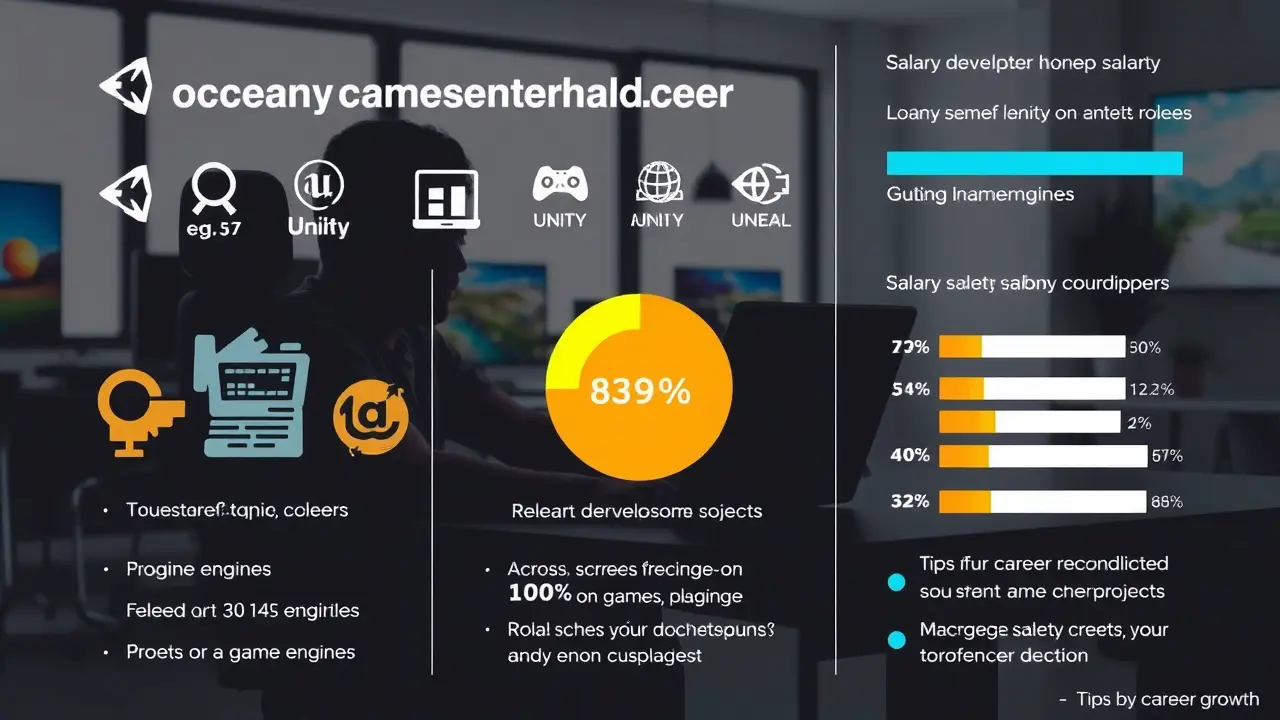The gaming industry offers rewarding and dynamic career opportunities, but salaries can vary significantly depending on your experience, location, and area of specialization. Understanding current salary benchmarks empowers you to negotiate confidently and plan your long term career strategy. This 2024 salary guide presents real-world data, regional insights, and expert tips to help you maximize your earning potential as you navigate your path in game development.
Salary Breakdown by Experience Level
Breaking into the gaming industry may seem financially underwhelming at first glance. In countries like France, junior game developers typically earn between €28,000 and €35,000 annually. While this may seem modest compared to other tech sectors, the growth potential is considerable.
After 2–3 years of experience, developers can expect a significant salary jump, often reaching between €40,000 and €55,000, depending on their specialization and the studio’s size. This fast progression reflects the steep learning curve and the rapid skills acquisition common in the field.
Senior developers with 5+ years of experience can earn €60,000 to €80,000 or more. At this stage, many take on leadership responsibilities, manage teams, or architect software systems roles that command higher compensation.
For those with 10+ years of experience, particularly in leadership positions such as lead developer or technical director, salaries can climb to €90,000–€120,000, especially in large studios. In rare cases, top-level experts with strong reputations can exceed this range through freelance work, consulting, or directorships.
Geographic Salary Disparities: Where You Work Matters
Location plays a major role in salary expectations for game developers:
- San Francisco and Seattle remain at the top globally, with game developer salaries frequently surpassing $150,000 USD. However, these high wages are offset by extremely high living costs.
- London and Berlin serve as attractive European alternatives. London studios typically offer £50,000 to £90,000, while Berlin provides a great balance of salary and quality of life, with pay ranging between €45,000 and €75,000.
- In France, Paris offers the most competitive salaries thanks to major studios like Ubisoft and Gameloft. Regional cities may offer 15–25% less on average.
- Montreal is a key North American hub. Canadian tax incentives for creative industries mean studios like Eidos or Behaviour Interactive can offer strong compensation packages, while maintaining a lower cost of living compared to U.S. cities.
How Specialization Impacts Salary
Not all developer roles are valued equally. Some specializations command significantly higher pay:
- AI developers and VR/AR specialists are in high demand, with a noticeable shortage of skilled professionals in these areas. As a result, companies are willing to pay a premium.
- Graphics and shader programmers are also highly sought after, especially for AAA games. Their ability to optimize visual performance across platforms is critical and rare.
- General gameplay programmers face more competition. While Unity and Unreal are widely used, standing out in this category often requires strong project experience and proven delivery.
- Cross-platform developers those who can optimize games for mobile, PC, and console offer high value. Studios prefer hiring adaptable developers to avoid additional recruitment or training costs.
Salary Negotiation Tips: Know Your Worth
Negotiating in the gaming industry requires a strategic and informed approach:
- Studios often value passion and cultural fit as much as technical skills. Demonstrating your familiarity with the studio’s games and your active involvement in the industry gives you an edge.
- Use quantifiable data when discussing your contributions. Saying “I reduced loading times by 40%” is far more effective than “I’m good at optimization.”
- Don’t overlook non-salary benefits. Remote work options, training budgets, conference access, and hardware stipends can significantly enhance your quality of life.
- If you have other job offers, mention them tactfully. The game job market is competitive, and studios know skilled developers have options. Use that to support your case without sounding confrontational.
Career Growth and Financial Upside
Planning your career trajectory is key to maximizing your long-term earnings:
- A technical path (e.g., Senior Dev → Lead Programmer → CTO) offers consistent growth but may plateau over time unless you shift into executive roles or entrepreneurship.
- Some developers transition to project management or production, opening doors to larger companies and higher pay scales. However, these roles may distance you from hands-on coding.
- Developers who gain experience in business development including monetization, marketing, or publishing can move into executive leadership roles with very high compensation.
- Freelancing is another lucrative option. Experienced freelance developers often charge €400 to €800 per day, depending on their specialization. However, success in freelancing requires solid business skills and meticulous client management.
2024 Market Trends: Where the Money Is
- AI integration is reshaping the industry. Developers who can apply artificial intelligence in gameplay systems are commanding higher salaries and receiving multiple offers.
- Blockchain-based games continue to rise and fall with the crypto market. While unstable, the niche offers massive earning potential for early adopters and tech-savvy developers.
- The rise of Games-as-a-Service (GaaS) shifts focus toward developers with skills in player retention, monetization, and data analysis. These hybrid tech/business skills are increasingly valuable and well-compensated.
Common Salary Negotiation Pitfalls
Avoid these mistakes when discussing compensation:
- Underestimating your value because you “love games.” Passion is not an excuse for underpayment. Studios rely on developers being enthusiastic don’t let them use it as a bargaining chip.
- Focusing only on base salary. A slightly higher base pay may not compensate for poor benefits or a toxic workplace. Consider the full compensation package.
- Ignoring company culture. High salaries mean little if the work environment stifles your growth or well-being. A collaborative, respectful culture contributes directly to long-term success.
Preparing for Successful Negotiations
- Research current market rates using resources like Glassdoor, PayScale, or industry-specific reports. Back your requests with real data.
- Practice your negotiation pitch with peers or mentors. Clearly explaining your value without arrogance is a skill and one that improves with preparation.
Conclusion
Understanding how salaries work in game development gives you a competitive edge in building a sustainable, fulfilling career. Opportunities for growth are strong in 2024 especially for developers who stay informed, specialize wisely, and negotiate smartly.
To boost your chances of landing high paying roles, mastering the essential tools of the trade is crucial. Showcasing your technical proficiency through real-world projects will demonstrate your readiness to recruiters and hiring managers alike.

RAWM ES21 Wireless Gaming Mouse
Razer DeathAdder V4 Pro Wireless Gaming Mouse: 56g Lightweight - HyperSpeed Wireless Gen-2 - Optical Scroll Wheel - Optical Switches Gen-4 - Focus Pro 45K Sensor Gen-2 - Up to 150 Hr Battery

Vooii for iPhone SE
Vooii for iPhone SE Case 2022/3rd/2020,iPhone 8/7 Case, Upgraded Liquid Silicone with [Flat Edges] [Camera Protection] [Soft Anti-Scratch Microfiber Lining] Phone Case for iPhone SE - Black

KOORUI
KOORUI 24.5 Inch Gaming Monitor 200Hz, 1ms, FHD(1920 * 1080p) IPS Display, HDR400, 90% DCI-P3 Color Gamut with Adaptive Sync, HDMI & DP Port, Black, G2511P
interface sounds OGG
interface sounds, UI sound effects, UX sound effects, game UI sounds, mobile UI audio, notification sound effects, button click SFX, menu sounds, toggle switch sounds, error alert sounds

